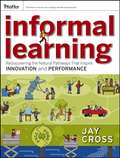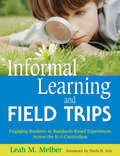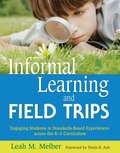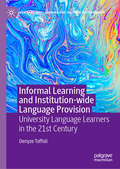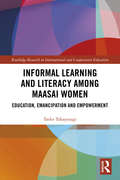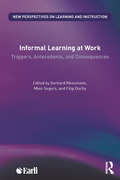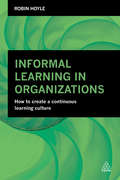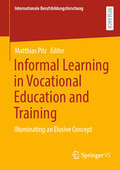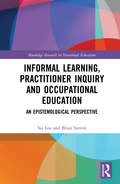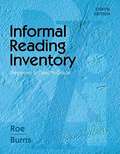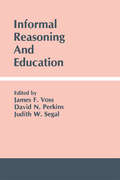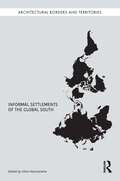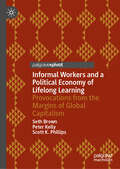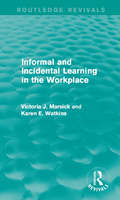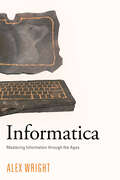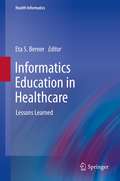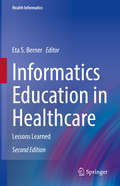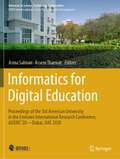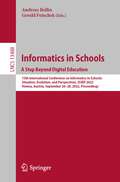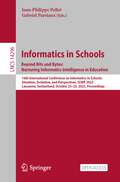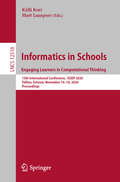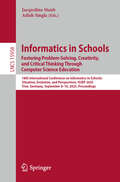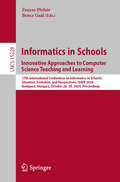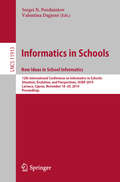- Table View
- List View
Informal Learning
by Jay CrossMost learning on the job is informal. This book offers advice on how to support, nurture, and leverage informal learning and helps trainers to go beyond their typical classes and programs in order to widen and deepen heir reach. The author reminds us that we live in a new, radically different, constantly changing, and often distracting workplace. He guides us through the plethora of digital learning tools that workers are now accessing through their computers, PDAs, and cell phones.
Informal Learning and Field Trips: Engaging Students in Standards-Based Experiences Across the K-5 Curriculum
by Leah M. MelberThe author shows teachers how to incorporate constructivist philosophy and inquiry-based learning techniques for standards-aligned, off-site learning experiences and provides guidelines for developing corresponding classroom activities.
Informal Learning and Field Trips: Engaging Students in Standards-Based Experiences across the K?5 Curriculum
by Leah M. Melber Doris B AshTurn every field trip into a high-quality learning experience!What youngster isn't excited at the prospect of taking a field trip? Enthusiastic students present teachers with the ideal scenario for creating meaningful out-of-the-classroom encounters and giving students the building blocks to help them become active participants in their own educational process.This resource helps educators take full advantage of off-site educational opportunities by developing lessons that connect informal learning with content standards. Based on constructivist philosophy and inquiry-based learning, the book provides numerous sample lesson plans and technology tips, and includes: Learner-centered activities for language arts, math, science, social studies, and fine art Ways to support English Language Learners and special education students Guidelines for developing corresponding classroom activities Strategies for building partnerships with informal learning sites Methods for bringing museum-type activities into the classroom when a trip is not possibleField trips turn the whole world into a classroom. Informal Learning and Field Trips helps enrich students' lives as they explore the world outside the school grounds and gives teachers a prime opportunity to revitalize the learning experience.
Informal Learning and Institution-wide Language Provision: University Language Learners in the 21st Century (New Language Learning and Teaching Environments)
by Denyze Toffoli“Theoretically wise and practically powerful, this book is about how to take full advantage of advances in technology and the learner autonomy they afford, rather than simply adapt to or deny them. It issues a clarion call to language educators and administrators interested in building on recent advances in language learning via the informal avenues of digital communications.” --Mark Dressman, Professor Emeritus, University of Illinois at Urbana-Champaign, US, Professor and Chair of English at Khalifa University, UAE “This important and original book challenges us to rethink the design and delivery of the language learning opportunities universities provide for their students. Drawing on Complex Dynamic Systems Theory, Self-Determination Theory and her own empirical explorations of informal online language learning, Denyze Toffoli paints a portrait of today’s university language learner that is novel, unexpected and urgent.” --David Little, Fellow and Associate Professor Emeritus at Trinity College, IrelandThis book takes a fresh look at both context and the language learner in an attempt to shed light on the holistic and ever-changing system of the contemporary L2 speaker’s language development. Drawing on complex dynamic systems theory as a means to more fully understand the holistic nature of contemporary language learning, the author attempts to bridge the longstanding gap between formal language provision in Higher Education institutions, and more informal language acquisition achieved through activities such as listening to music, watching films and television, and playing games. Based on a theoretical understanding of the interplay between these contexts, contents and practices, the author offers suggestions concerning the shape of language centres in higher education and the role of teachers in readying the contemporary language learner for autonomous lifelong and lifewide language development. This book will be of particular interest to language teachers, teacher trainers, and higher education administrators.
Informal Learning and Literacy among Maasai Women: Education, Emancipation and Empowerment (Routledge Research in International and Comparative Education)
by Taeko TakayanagiInformal Learning and Literacy among Maasai Women highlights the importance and role of informal education in the emancipation and development of Maasai village women in Kenya. At present, knowledge and research on the impact of informal learning and literacy on community development is limited, and there is a gap between policy level discussions and women’s lived experiences. Using a postcolonial feminist framework, this book sets out to examine linkages between informal learning and literacy, human development and gender inequality. Despite improvements in recent years, access to traditional education remains restricted for many women in rural communities across Kenya. Takayangi’s book is the first to introduce how Maasai village women utilise informal learning and literacy for collective empowerment as well as to sustain their own well-being and that of their families. It presents the perspectives of both local women and institutions and argues that women’s learning is most effective when located within their own socio-cultural and political discourses, and when their voices are listened to and heard. This ethnographic research study is a valuable resource that will contribute to the knowledge of literacy from both theoretical and practical perspectives. It is an essential read for those studying or researching information education, development studies and gender, or education, as well as for teachers, community leaders and aid workers.
Informal Learning at Work: Triggers, Antecedents, and Consequences (New Perspectives on Learning and Instruction)
by Filip Dochy Mien Segers Gerhard MessmannInformal Learning at Work reflects the growing interest in changing the way the workplace encourages and enhances learning and professional development. Due to societal, economic, and technological developments, organisations face the pressure of growing knowledge-intensity and the need for innovations. As a result, employees are expected to adapt to new situations and constantly update their skillsets within an increasingly challenging environment. This book brings together cross-disciplinary perspectives from leading international researchers, drawing on a range of theoretical and empirical studies. <P><P>Extensively researched and expertly edited, this new addition to the EARLI New Perspectives on Learning and Instruction series outlines the starting points for future research, and highlights the benefits and implications for those aiming to foster informal learning at work, covering areas such as: <li>professional judgement <li>improving the structure of work tasks <li>facilitating innovative work behaviour <li>the place of informal learning within teaching <P><P>Informal Learning at Work presents original quantitative and qualitative studies as well as integrative analyses of worldwide research and is an invaluable introduction to this highly topical subject.
Informal Learning in Organizations
by Robin HoyleAs the pace of change in the workplace accelerates and training budgets are challenged, it becomes essential for employees to learn as they go along. In this connected world, new ways of learning are emerging all of the time, whether the learning is planned, unexpected or self-directed. For those responsible for learning and development in organizations, understanding how this kind of informal learning can be utilised and measured is key to providing efficient and cost-effective ways of delivering on organizational objectives around people development. Informal Learning in Organizations offers practical tools, including checklists and action plan questions, to guide the Learning and Development practitioner in how to design and implement an informal learning strategy that is personalised to the needs of their own organization. It combines the latest thinking on new technology and practices with established theory and research to provide an evidence-based review of informal learning and its true impact. It offers an overview of how and why informal learning resonates with people, how it works and when and why it doesn't. This book will assist the reader in making sense of their connected environments to create a continuous learning culture in their organizations.
Informal Learning in Vocational Education and Training: Illuminating an Elusive Concept (Internationale Berufsbildungsforschung)
by Matthias PilzEntering educational debate more than 50 years back, the notion of informal learning is still highly relevant today and of specific interest in the context of vocational education and training (VET). Still, we do not know a lot about a wide range of aspects of the topic as well as interactions between formal and informal learning. Defining the latter precisely presents difficulties to the world of research, as the concept itself is characterised by flexibility and openness. This book was initiated to fill a gap in understanding informal learning in the context of training and development. 18 chapters cover a wide range of aspects and different objectives, levels and places of informal learning. Authors from different parts of Europe as well as Japan, Australia, India and Bangladesh have been selected to contribute to the topic from varying country perspectives. As such, this volume makes a unique contribution in exploring informal learning in VET.
Informal Learning, Practitioner Inquiry and Occupational Education: An Epistemological Perspective (Routledge Research in Vocational Education)
by Brian Sutton Sai LooInformal Learning, Practitioner Inquiry and Occupational Education explores how practitioners in a variety of occupations perform their jobs and argues that working and learning are intricately connected. Drawing on theories around working and learning in informal, formal and lifelong settings, the book gives insights into how workers negotiate their occupational practices. The book investigates four related concepts – informal learning, practitioner inquiry, occupational education and epistemological perspectives. The combinations of theories and empirical case studies are used to provide a conceptual framework of inquiry where knowledge, abilities, experiences and skill sets play a significant aspect. It presents 11 case studies of professions ranging from conventional occupations of acting, detective work, international road transportation to emerging professions of boardroom consultancy, nutritional therapy and opinion leadership. This book will be of great interest for academics, scholars and postgraduate students who are engaged in the study of informal education, vocational education and occupation-related programmes. It will also offer significant insights for related education practitioners wanting to have greater understanding of their own journeys and practices.
Informal Reading Inventory: Pre-primer to Twelfth Grade (Eighth Edition)
by Betty D. Roe Paul C. Burns'Informal Reading Inventory'- is designed for use by several different groups like pre-service college students learning informal reading inventories and as a practical guide for special reading teachers as an easily administered assessment instrument for assessing their students' reading progress.
Informal Reasoning and Education
by James F. Voss David N. Perkins Judith W. SegalBased on extensive reasoning acquisition research, this volume provides theoretical and empirical considerations of the reasoning that occurs during the course of everyday personal and professional activities. Of particular interest is the text's focus on the question of how such reasoning takes place during school activities and how students acquire reasoning skills.
Informal Settlements of the Global South (Architectural Borders and Territories)
by Gihan KarunaratneBringing together case studies ranging across the globe, including theUS-Mexico borderlands, the Calais encampment in France, refugee camps in Kenya, Uganda and Bangladesh and contested ‘informal’ enclaves and communities in the cities of India, China, Brazil, Nigeria and South Africa, this book challenges current ways of thinking about the governance of human settling, mobility and placemaking. Together, the 15 essays question the validity of the conventional hegemonic divisions of Global North vs. Global South and ‘formal’ vs. ‘informal’, in terms of geographic presence, transborder performances and the ideological inter-dependence of Northern and Southern spaces, spatial practices and the uniformity of authoritative enforcements. The book, whose authors themselves come from all over the world, uses ‘Global South’ as a methodological apparatus to ask the ‘Southern’ question of settling and unsettling across the globe. Crucially, the studies reveal the sentiments, resourcefulness and the agency of those positioned by the powerful within the dichotomies of formal/informal, legitimate/ illegal, privileged/marginalized, etc., who are traditionally identified within the dominant development discourse as mere numbers or designated by intervening institutions as helpless recipients. By focussing on hitherto invisible events and untold stories of adaptation, negotiation and contestation by people and their communities, this volume of essays takes the ongoing North-South debate in new directions and opens up to the reader’s fresh areas of enquiry. It will be of interest to researchers and students of architecture, planning, politics and sociology, as well as built environment professionals.
Informal Workers and a Political Economy of Lifelong Learning: Provocations from the Margins of Global Capitalism
by Peter Kelly Seth Brown Scott K. PhillipsThis book makes an innovative, sociologically informed contribution to academic and policy discussions about informal work, skills and training for lifelong learning (LLL) and the promise of decent work and just transitions for sustainable development. It does so with an explicit focus on challenges and opportunities as they shape informal economies and the experiences of informal workers in Latin America and the Caribbean, the Middle East and North Africa, Sub-Saharan Africa, Central and Eastern Europe, and the Asia Pacific. The authors highlight historical and contemporary characteristics of informality in different regions from a political economy of LLL perspective. This political economy approach draws on theories of post- and neo- colonialism, space, place and globalisation, critical accounts of curriculum and pedagogy in skills and vocational education and training. The book will appeal to students and scholars of education, particularly adult education and LLL and technical and vocational education and training, as well as sociology, labour economics, and international and sustainable development.
Informal and Incidental Learning in the Workplace (Routledge Revivals)
by Victoria J. Marsick Karen WatkinsToday, rapid change is a constant challenge in the workplace, and thousands of individuals need to be involved in continuous learning. Traditional training approaches, however, do not emphasise informal and incidental learning. Furthermore, since informal learning us seldom designed, learning outside of a structured experience may lead to mistaken or dysfunctional learning. Strategies for improving informal learning are urgently needed. This book, first published in 1990, responds to this need by taking a challenging look at many assumptions about workplace learning outside of the classroom and by proposing methods to improve it. They develop a theory of informal and incidental workplace learning based on current developments in training and human resource development which they illustrate with readable and illuminating case studies which tell vivid stories of adult education and human resource development practice. Informal and Incidental Learning in the Workplace is essential reading for researchers and practitioners of human resource development, and also for students of education and adult learning.
Informatica: Mastering Information through the Ages
by Alex WrightInformatica—the updated edition of Alex Wright's previously published Glut—continues the journey through the history of the information age to show how information systems emerge. Today's "information explosion" may seem like a modern phenomenon, but we are not the first generation—or even the first species—to wrestle with the problem of information overload. Long before the advent of computers, human beings were collecting, storing, and organizing information: from Ice Age taxonomies to Sumerian archives, Greek libraries to Christian monasteries.Wright weaves a narrative that connects such seemingly far-flung topics as insect colonies, Stone Age jewelry, medieval monasteries, Renaissance encyclopedias, early computer networks, and the World Wide Web. He suggests that the future of the information age may lie deep in our cultural past.We stand at a precipice struggling to cope with a tsunami of data. Wright provides some much-needed historical perspective. We can understand the predicament of information overload not just as the result of technological change but as the latest chapter in an ancient story that we are only beginning to understand.
Informatics Education in Healthcare: Lessons Learned
by Eta S. BernerWith the growth of the use of electronic medical records there has been a concomitant increase in training and education programs in informatics and health IT to prepare individuals as researchers, leaders, managers and developers of informatics tools, intervention and systems. This book will provide both theoretical and practical information for educators in a variety of these programs. We will include the "tacit knowledge" of experienced teachers, which is often not captured in traditional education textbooks. The book would be a blend of strategies, methods and suggested curriculum content. The book is designed to address issues common to all programs as well as education programs for special audiences. The chapter authors are all nationally recognized for their expertise in, and commitment to, informatics education. Although some chapters appear to be addressing specialized areas, there are general lessons to be learned even from those chapters in addition to the chapters that are specifically addressing general issues. The aims of the book are as follows: To address the lack of a broad based book in best practices for informatics education To provide a educational knowledge foundation for informatics educators at all levels To provide specific lessons learned in specialized informatics education areas.
Informatics Education in Healthcare: Lessons Learned (Health Informatics #92)
by Eta S. BernerThis heavily revised second edition defines the current state of the art for informatics education in medicine and healthcare. This field has continued to undergo considerable changes as the field of informatics continues to evolve. The book features extensively revised chapters addressing the latest developments in areas including relevant informatics concepts for those who work in health information technology and those teaching informatics courses in clinical settings, techniques for teaching informatics with limited resources, and the use of online modalities in bioinformatics research education. New topics covered include how to get appropriate accreditation for an informatics program, data science and bioinformatics education, and undergraduate health informatics education. Informatics Education in Healthcare: Lessons Learned addresses the broad range of informatics education programs and available techniques for teaching informatics. It therefore provides a valuable reference for all involved in informatics education.
Informatics Practices class 11 - NCERT
by National Council of Educational Research and TrainingThis book focuses on the fundamental concepts related to handling of data while opening a window to the emerging areas of data processing. It seeks to address the dual challenges of reducing curricular load as well as introducing the latest development in the field of ICT.
Informatics for Digital Education: Proceedings of the 3rd American University in the Emirates International Research Conference, AUEIRC'20—Dubai, UAE 2020 (Advances in Science, Technology & Innovation)
by Asma Salman Assem TharwatThis book, consisting of three separate parts, deliberates extensively on the effects of informatics and digital systems on modern education systems, tackling topics such as inclusivity for special needs students, context-based learning, the ramifications of online instruction, and big data analysis. Informatics & data gathering is arguably one of the most vital elements brought forth by technological advancement in the modern age. Digital systems have been thoroughly incorporated into various disciplines in society, most notably in the field of education and pedagogy. The propagation of knowledge shapes nations’ futures by empowering younger generations, and a comprehensive assessment of the effects of digital education, and the increasing incorporation of ICT in pedagogy, ensure their continued prosperity. Ensuring a bright future for all students, this title proves invaluable for educators, researchers, policymakers, and practitioners.
Informatics in Schools. A Step Beyond Digital Education: 15th International Conference on Informatics in Schools: Situation, Evolution, and Perspectives, ISSEP 2022, Vienna, Austria, September 26–28, 2022, Proceedings (Lecture Notes in Computer Science #13488)
by Andreas Bollin Gerald FutschekThis book constitutes the proceedings of the 14th International Conference on Informatics in Schools: Situation, Evolution and Perspectives, ISSEP 2021, held in Nijmegen, The Netherlands, in November 2020. Due to COVID-19 related travelling restrictions the conference had to be switched to online format. The 12 full papers presented together with 4 short papers were carefully reviewed and selected from 57 submissions. They are organized in 2 topical sections named: state of research and best practice, country, and experience reports.As in our school education subjects like “digital literacy" or "media literacy" are making their way in, complementing or partially replacing computer science education. The current ISSEP conference reacted to this trend and therefore invited computer scientists, media didactics, and representatives of politics, media and industry to a discussion round on the topic "Media Education or Computer Science? Quo Vadis, School Teaching?".
Informatics in Schools. Beyond Bits and Bytes: 16th International Conference on Informatics in Schools: Situation, Evolution, and Perspectives, ISSEP 2023, Lausanne, Switzerland, October 23–25, 2023, Proceedings (Lecture Notes in Computer Science #14296)
by Jean-Philippe Pellet Gabriel ParriauxThis book constitutes the proceedings of the 16th International Conference on Informatics in Schools: Situation, Evolution and Perspectives, ISSEP 2023, held in Lausanne, Switzerland, during October 23–25, 2023. The 14 full papers presented in this book were carefully reviewed and selected from 47 submissions. They are organized in four topical sections named: artificial intelligence and its applications; competitions, problem solving, and computational; robotics and unplugged modalities; and curricula and computer science concepts. This is an open access book.
Informatics in Schools. Engaging Learners in Computational Thinking: 13th International Conference, ISSEP 2020, Tallinn, Estonia, November 16–18, 2020, Proceedings (Lecture Notes in Computer Science #12518)
by Mart Laanpere Külli KoriThis book constitutes the proceedings of the 13th International Conference on Informatics in Schools: Situation, Evolution and Perspectives, ISSEP 2020, held in Tallinn, Estonia, in November 2020. Due to COVID-19 related travelling restrictions the conference had to be switched to online format. The 18 revised full papers presented were carefully reviewed and selected from 53 submissions. They are organized in topical sections named: Tasks for Informatics Competitions; Engagement and Gender Issues in School Informatics; Informatics Teacher Education; Curriculum and Pedagogical Issues.
Informatics in Schools. Fostering Problem-Solving, Creativity, and Critical Thinking Through Computer Science Education: 18th International Conference on Informatics in Schools: Situation, Evolution, and Perspectives, ISSEP 2025, Trier, Germany, September 8–10, 2025, Proceedings (Lecture Notes in Computer Science #15958)
by Jacqueline Staub Adish SinglaThis book constitutes the proceedings of the 18th International Conference on Informatics in Schools: Situation, Evolution, and Perspectives, ISSEP 2025, held in Trier, Germany, during September 8–10, 2025. The 13 full papers presented were carefully reviewed and selected from 41 submissions. The papers cover the following topics: Curricula and Computer Science Concepts; Teachers&’ Perspective; AI and Digital Literacy; Programming, Problem Solving, and Computational Thinking.
Informatics in Schools. Innovative Approaches to Computer Science Teaching and Learning: 17th International Conference on Informatics in Schools: Situation, Evolution, and Perspectives, ISSEP 2024, Budapest, Hungary, October 28–30, 2024, Proceedings (Lecture Notes in Computer Science #15228)
by Zsuzsa Pluhár Bence GaálThis book constitutes the proceedings of the 17th International Conference on Informatics in Schools: Situation, Evolution and Perspectives, ISSEP 2024, held in Budapest, Hungary, during October 28–30, 2024. The 14 full papers presented were carefully reviewed and selected from 42 submissions. The papers cover the following topics: curricula and computer science concepts; problem solving, algorithms and programming; teacher’s perspective.
Informatics in Schools. New Ideas in School Informatics: 12th International Conference on Informatics in Schools: Situation, Evolution, and Perspectives, ISSEP 2019, Larnaca, Cyprus, November 18–20, 2019, Proceedings (Lecture Notes in Computer Science #11913)
by Valentina Dagienė Sergei N. PozdniakovThis book constitutes the proceedings of the 12th International Conference on Informatics in Schools: Situation, Evolution and Perspectives, ISSEP 2019, held in Larnaca, Cyprus, in November 2019. The 23 revised full papers presented were carefully reviewed and selected from 55 submissions. They are organized in topical sections named : teacher education in informatics, primary education in informatics, contemporary computer science ideas in school informatics, teaching informatics: from highschool to university levels, contests, competitions and games in informatics.
